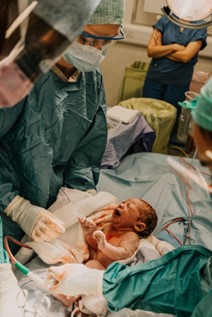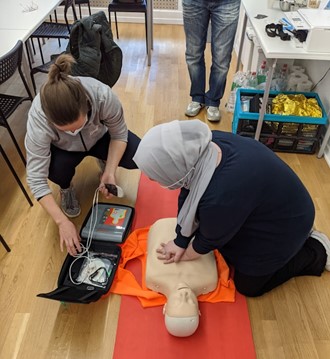Katha Knippa

Katha Knippa of Houston
Katha Knippa, originally from Kansas, embarked on a transformative journey that led her to Houston in 1974. With a nursing degree under her belt, Katha dedicated herself to various facets of nursing, specializing in labor and delivery, operating rooms, and transplant care. Her career path has been as diverse as it has been fulfilling, reflecting her unwavering commitment to healthcare.
Cherishing Family
Throughout her life, Katha has found contentment and fulfillment. Her greatest joys are her two adult children: Matt, who lives nearby, and Jess, residing out of state. She beams with pride when speaking of her grandson, Robert, a spirited 12-year-old who brings immense happiness to her life.
Finding Purpose
Semi-retired for the past eight years, Katha Knippa of Houston continues to engage in occasional nursing roles, leveraging her wealth of experience to contribute to the healthcare community. Beyond her professional life, Katha finds purpose in her community involvement. She attends religious services regularly and remains an active member of several charitable organizations, including the American Red Cross, Ordinary Women, and donates to Goodwill and Doctors Without Borders. Her deep empathy extends to practical gestures of kindness, such as keeping bottled water and food in her car to offer to the homeless she encounters in Houston—a testament to her compassionate spirit.

Pursuit of Knowledge
Katha Knippa of Houston enjoys the simple pleasures of life. She finds solace in reading historical novels and journals on history, staying informed of current events through TV news shows. Her commitment to staying engaged with current affairs and enriching her mind underscores her lifelong pursuit of knowledge and understanding.
Resilience and Compassion
As Katha reflects on her journey, she embodies resilience and compassion, traits that have shaped her outlook on life. Her story is a testament to finding fulfillment in simplicity, cherishing family bonds, and making a meaningful difference in the lives of others. Through her dedication to nursing, community service, and personal enrichment, Katha Knippa continues to inspire those around her with her unwavering spirit and commitment to making the world a better place. Transitioning into the critical topic of emergency preparedness, she recognizes the importance of organizations like the American Red Cross in saving lives through comprehensive training programs.
Emergency Preparedness: How American Red Cross Training Saves Lives
In a world where natural disasters and emergencies can strike unexpectedly, being prepared can make all the difference between safety and vulnerability. The American Red Cross stands at the forefront of disaster response and preparedness, offering crucial training programs that empower communities to handle crises effectively. Katha Knippa delves into why this training is essential, how it saves lives, and practical tips for communities to enhance their emergency readiness.
Why Emergency Preparedness Matters
Emergency preparedness is not just a theoretical concept; it’s a proactive approach to safeguarding lives and property. The American Red Cross emphasizes the importance of preparedness through a range of training programs designed to equip individuals and communities with the skills and knowledge needed to respond swiftly and effectively during emergencies.
Real-Life Impact
Consider the case of residents of a flood-prone area. Through American Red Cross training, individuals in these locations can learn how to create an emergency kit, develop a family communication plan, and evacuate safely when flood warnings are issued. When heavy rains caused a nearby river to overflow, families with this training were prepared. They safely evacuated to higher ground with their emergency supplies, minimizing risk and ensuring their safety until the floodwaters receded.
The Role of American Red Cross Training
American Red Cross training encompasses various aspects of emergency preparedness, including first aid, CPR, AED (Automated External Defibrillator) use, disaster response, and community resilience. Katha Knippa of Houston explains that these courses are not just about acquiring skills but also fostering a culture of readiness and resilience within communities.

Key Training Programs
- First Aid and CPR/AED: Knowing how to administer first aid and perform CPR can save lives during emergencies such as heart attacks, accidents, or sudden medical crises.
- Disaster Response Training: From hurricanes to wildfires, this training equips participants with essential knowledge on evacuation procedures, shelter management, and providing assistance to affected individuals.
- Community Resilience: Encouraging communities to prepare for disasters collectively, fostering partnerships with local authorities, and developing action plans for various scenarios.
Practical Tips for Communities
Implementing effective emergency preparedness requires concerted efforts at both individual and community levels. Katha Knippa provides more information below:
Create an Emergency Plan
- Develop a family emergency plan that includes evacuation routes, emergency contacts, and meeting points.
- Practice emergency drills regularly to ensure everyone knows what to do during a crisis.
Build an Emergency Kit
- Stock up on essential supplies such as non-perishable food, water, medications, first aid supplies, flashlights, batteries, and personal hygiene items.
- Customize your kit based on your family’s needs and any specific considerations such as pets or medical conditions.
Stay Informed
- Monitor local weather alerts and emergency broadcasts.
- Sign up for community alert systems and stay connected through reliable sources of information during emergencies.
Learn First Aid and CPR
- Enroll in American Red Cross courses to learn how to administer first aid, perform CPR, and use an AED.
- Encourage family members, neighbors, and colleagues to undergo training to enhance community resilience.
Volunteer and Support
- Consider volunteering with the American Red Cross or other disaster relief organizations to support relief efforts in your community.
- Donate to disaster relief funds to help those affected by emergencies.
Conclusion
American Red Cross training plays a vital role in preparing individuals and communities for emergencies. By fostering a culture of preparedness, equipping people with life-saving skills, and promoting collaboration among stakeholders, these programs save lives and mitigate the impact of disasters. Whether you’re preparing for natural disasters, medical emergencies, or unexpected crises, taking proactive steps today can make a significant difference tomorrow.
Embrace the power of preparedness with American Red Cross training and ensure your readiness to face any challenge that comes your way. Together, we can build resilient communities that thrive even in the face of adversity.
For deeper insights into Katha Knippa’s Houston journey or articles covering Democrat politics, support for the unhoused, symptoms and care for depression in the elderly, and American Red Cross disaster assistance, visit her blog.